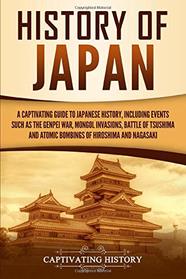Like many Americans, I know little of Japan's history and this Captivating History book seems to hit the important points. Japan was first inhabited thousands of years ago. It seems that the earliest era to be studied is The Jomon Period (8000c.to 300BC). The 'Jamon' name comes from the cord-marked pattern style of pottery of the period.
I did not realize that the Samurai lords, called 'shogun,' took over the government in 1185 and ruled Japan until 1868. Japan had a great deal of catching up to do after they opened their markets to the world because their isolation had stifled learning and growth. Amazingly, the Japanese closed their country for 217 years.
Something I really appreciated, was the author's inclusion of the issues between China, Korea, and Japan. I was sure they were interconnected in some way, but the Captivating History clarified their complicated associations.
This book is the first time I've seen the term Japanese 'herbivore men.' It is an interesting facet of Japanese life today. One article I read says that up to 60% of today's Japanese males in their 20s and 30s identify with this phenomenon.
Another fascinating aspect of Japan is the way their emperors are named. According to The Japan Times: "...era names, aren't merely used to identify the reign of an emperor. They are symbols of sorts that reflect the zeitgeist of the nation and indicate the path the country as a whole aspires to. The era under Emperor Akihito's reign, Heisei, was named with hopes to achieve peace following the tumultuous Showa Era, which saw Japan's descent into World War II and subsequent recovery.
Reiwa, * ... was named with a desire for the people to be hopeful and to cultivate a new future, as well as pass down the country's rich history, culture and natural beauty to the next generation."
*Naruhito's era name (he's the new emperor, as of 1 May 2019).
I did not realize that the Samurai lords, called 'shogun,' took over the government in 1185 and ruled Japan until 1868. Japan had a great deal of catching up to do after they opened their markets to the world because their isolation had stifled learning and growth. Amazingly, the Japanese closed their country for 217 years.
Something I really appreciated, was the author's inclusion of the issues between China, Korea, and Japan. I was sure they were interconnected in some way, but the Captivating History clarified their complicated associations.
This book is the first time I've seen the term Japanese 'herbivore men.' It is an interesting facet of Japanese life today. One article I read says that up to 60% of today's Japanese males in their 20s and 30s identify with this phenomenon.
Another fascinating aspect of Japan is the way their emperors are named. According to The Japan Times: "...era names, aren't merely used to identify the reign of an emperor. They are symbols of sorts that reflect the zeitgeist of the nation and indicate the path the country as a whole aspires to. The era under Emperor Akihito's reign, Heisei, was named with hopes to achieve peace following the tumultuous Showa Era, which saw Japan's descent into World War II and subsequent recovery.
Reiwa, * ... was named with a desire for the people to be hopeful and to cultivate a new future, as well as pass down the country's rich history, culture and natural beauty to the next generation."
*Naruhito's era name (he's the new emperor, as of 1 May 2019).




